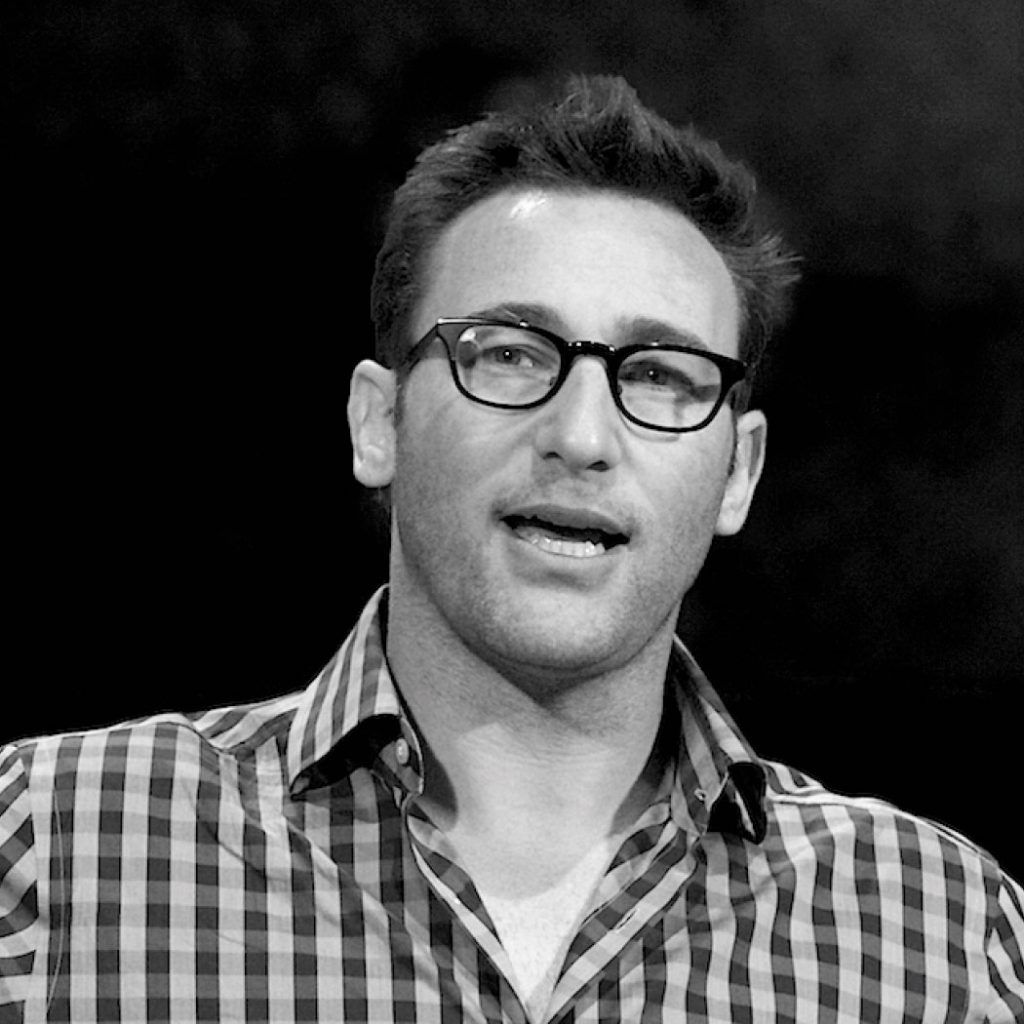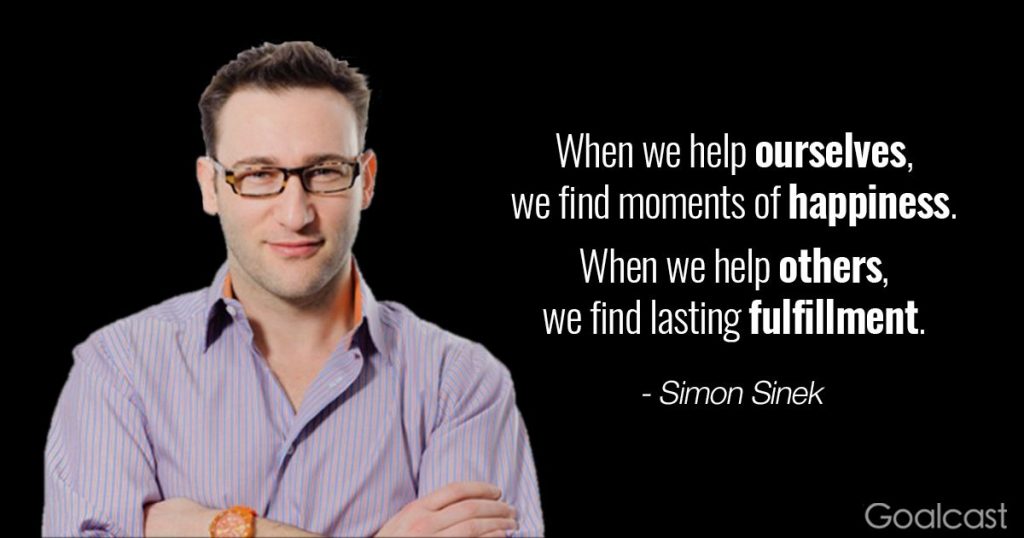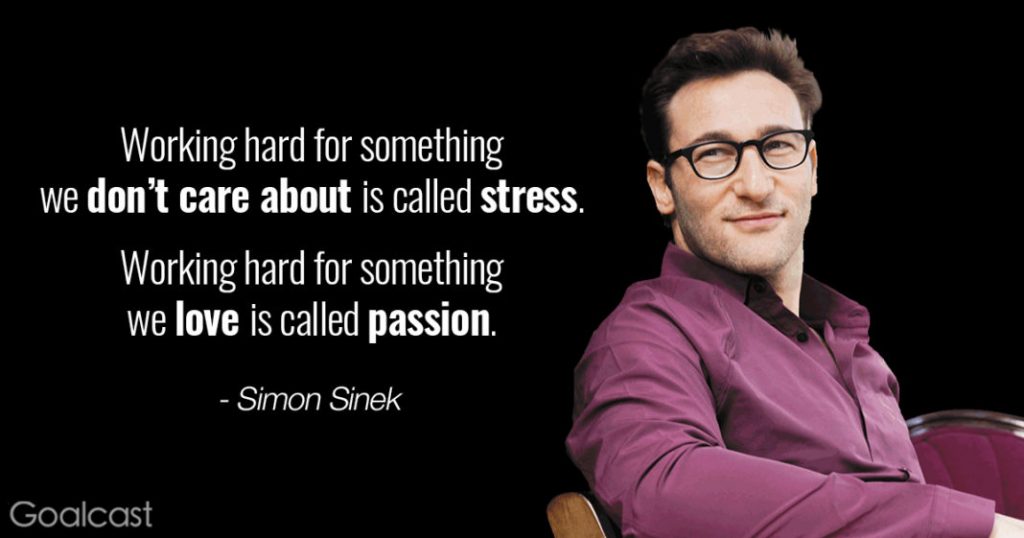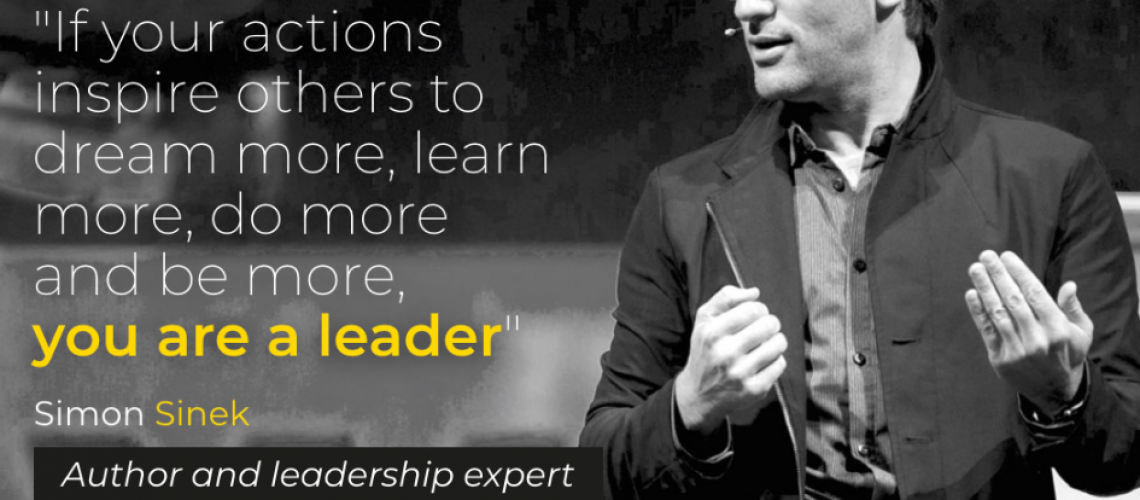LEADING AUTHORITY ON ORGANISATIONAL PERFORMANCE.

Simon has been described as “a visionary thinker with a rare intellect,” Sinek teaches leaders and organisations how to inspire people. His bold goal is to help build a world in which the vast majority of people wake up every single day feeling inspired, feeling safe at work, and feeling fulfilled at the end of the day. Simon is the Author of three best-selling books and is fascinated by the people that make the greatest, lasting impact in their organisations and in the world. Over the years, he has discovered some remarkable patterns of how they think, act and communicate and the environments in which people operate at their natural best.
His unconventional and innovative views on business and leadership have attracted international attention. From American Airlines to Disney and MARS, from big business to entrepreneurs to police forces, Simon has been invited to meet with an array of leaders and organisations in nearly every industry. He has also had the honour of sharing his ideas at the United Nations.

The things I love about hearing Simon speak is that as a fellow marketeer he speaks my language and truth. I adore to see the passion behind how fundamentally he is driven by his cause – in changing the world – he invites us all to think different, challenge ourselves to be better versions of ourselves in order to help each other. Delivered via trust, authenticity and most of all respect for all other humans.
He helps individuals and businesses to think differently, he articulate the steps and speaks the truth about leadership, courage and emotions and human condition. I love how he provides simple and clear examples of how organisations need to change the way they do things, to always appreciate from the customer up and that manager are here simply to help support their staff. All leadership is here to serve, empower and help – which in-turn ultimately supports customers and drives business growth.
There is a better way and here in Australia being a big island removed from much of the tough global pace, we need to embrace new and better ways to embrace the future and remove the fear of change. We all need to follow the passion that drives us. From my own perspective hand on heart I just love my job and I am honoured to support the people that I work with and manage. As I’m driven by my just cause to help people connect with brands and businesses that are delivering greatness- I get to help companies find and articulate their why and provide experience for customers and staff, whilst improving how they deliver their services and products via marketing and digital communications. I can’t wait to see Simon this November at the New York Study Tour.
Here is my wrap up taken from what I’ve read and watched of his “Infinite Mindset”
How do you win lots of battles and yet loose the war?
It begins with understanding the Playing field, generally there is a beginning, middle and end. However in an infinite game their are known and unknown players, rules are changeable and the rules are to propitiate the game or stay in the game as long as possible. When we pit a finite play with a finite player the system is stable- Football lis stable
When we pit an infinite player with an infinite player the system is also stable. The Cold War was stable as we could not have a winner or a loser and what happens is, one just drops out as they lack the resources or the will to continue to play. They run out of the will or resources, yet the game continues with or without them. The player just leaves the game.
Problems arise when you pit a finite player with an infinite player – one is playing to win and one is playing to keep playing. They make profoundly different choices which ultimately results with the finite player finding themselves in a quagmire. Running through will and resources trying to win. For example, the Vietnam war, the USA was fighting to win, north Vietnamese were fighting for their lives, the US ran out of will and resources they were fighting the wrong game.
This gets us thinking about context – business, politics and education.
“What game are they playing?” There is no such thing as winning in business, there’s no such thing as winning global politics, definitely no such thing as winning in Education.
Yet, if we listen to the language of too many organisations they don’t know the game they are in. They talk about “being the best”, they talk about being number 1. They talk about beating their competition. They talk about the salaries people could earn. Yet if people aren’t taught at university how to think differently, how to challenge the norm and be inventive where will they learn this?
The problem is there is no such thing as coming first, any metrics that we choose, where that be ranking in a magazine that has made arbitrary choices about how to rank your Universities or colleges – You had no say in, or another university that declares they are number 1 in x and number one in Y (all the while we haven’t agreed on the timeframes or metrics). It is just all smoke and mirrors- if you are playing by these rules it becomes more and more difficult to maintain the resources to say in the game. Money is becomes more difficult which now seems to be the primary objective which it never was.
Even the will of the people to commit their blood, sweat and tears to see your organisation advance into the future- the staff, the teachers and even the students will stop.
A couple of years ago I was speaking at a Microsoft education summit and Apple education summit. The vast majority of the senior executives at Microsoft spent the vast majority of their time presenting talking about how they were going to beat Apple.
At the Apple conference 100 % of the senior executives spent 100% of their presentations talking about how they were going to help teachers teach and how they can help students to learn.
One obsessed in where they were going, one was obsessed with their competition- not hard to guess who was in a quagmire!
At the end of my time Microsoft, they kindly gave me a zoom which was at the time their answer to the iPod touch, its beautifully made and worked great. So when I finished at apple I was chatting to Employee number 54 to be exact! I couldn’t help myself and told him that Microsoft gave me their Zoon and stirred the pot to say it is so much better than your iPod touch- and he said I have no doubt- the conversation was over.
The infinite player understands – sometimes your competitor has the better product and sometimes you have the better product. Sometimes you’re ahead and sometimes your behind both there is not such thing as best of first or beating your competition. There’s only ahead and behind- the reality of an infinite game is you are only competing against yourself, the objective everyday how do we become a better version of our own institution this year to how we were last year.

How do we improve the quality of our culture?
How do we improve the quality of the way we provide the services we claim to be providing?
We have to be constantly improving, improving, improving like there is no end game. It’s a game of constant improvement. Which means if we have to completely rethink about leadership for the infinite game- how should we be leading for the infinite game?
How do we improve ourselves that is the main point- of being in the infinite game as we don’t have the same metrics as everybody else and were not necessarily playing to the same ends.
There are 5 elements to the infinite game;
- Just cause (why does your organisation exist?- each organisation is different cultures there are cultural norms that wrap around sense of purpose, cause or belief.) A just cause is so just you would willingly sacrifice to be a part of it, turn down higher page job, willing to go on trips work later hours but it feels worth it. Apple believed people can set up to big brother – that’s why it attracts creative and thinkers. It’s not about achieving a goal, it’s not about winning, it’s about the milestone on the journey. We sometimes us vision, it’s nothing to do with vision of a dollar amount- Great organisations understand their just cause- they are so just that people would be willing to sacrifice to see the advancement of that cause. ‘Believe in what you’re doing “ vision of the future that does not yet exist- the people you want to attract believe your vision of the future. Because they want to be around people that want to build that does not yet exist- or you will be judged on superficial things.) shortermism. Just causes are things we believe in- people before profit. Gives our lives and our work meaning. We don’t have to create a vision we have to find a vision.
- Trusting team– it’s all because of the people, we can tell when someone is working on commission vs someone who enjoys what they do. People who love their job, higher order thinking. Managers ask how staff are doing, if they need anything to help me. I feel I can be myself, we feel we can make mistakes our bosses – create an environment my staff can work to their natural best and people can trust each-other- trusting teams. We rely on leaders setting the culture. We need teams that can put there hands up and say I need help without any fear without retribution (lying hiding or faking) they will not Amit – guess what happens to organisations that don’t have trust? They have people that turn up to work everyday lying hiding and faking. United airlines is a perfect example, a few years ago everyone remembers the story about how a passenger was dragged off the aircraft with broken nose, concussion teeth. The staff 100% knew that was the wrong thing to do, to stand by and not step in. They all stood back as they feared getting in trouble more than the feared doing the right thing. They stood back and watched. People need to feel safe, and agency to be. Who benefits customer and company. We know that our sense of enjoyment from our work, doesn’t come from work life balance or how much yoga we do. Our sense of enjoyment stress we have is all about our sense of control -when we feel we have control over our job, if control is taken away from us- that what increases stress dramatically for human beings. If you want to have an infinite game you must have trusting teams.- people willing to help each ire of admit when they have things wrong- only if the organisation gets things wrong.
- Worthy adversary/rival – first you must identify a company or an individual who is better than you, this helps you to identifying your own shortcomings or weaknesses. Seeing all of their strengths are all of my weaknesses. It’s much easier to hate than admit weaknesses, but this is the opportunity. When someone that is better than you in your industry or better in your company. It’s not that we should try to beat them, you should learn from them admire them, respect them, study them, as they are revealing our weaknesses it gives us the tools to improve. The game is not to beat them, its to stay in the game as long as possible. Apple initially had IBM then they dropped out the game then they had Microsoft -now its google and facebook interns of privacy- a worthy rival gives us the opportunity to see their strengths and identifying how we can improve. They give us tool to better ourselves and our companies. Healthy competition allows you to see yourself and to work harder to be the best you can. It’s not about creating internal competition, rivals are good, better leaders I want to be like that person or business- they make me insecure they are so good. A tool for constant improvement. Fall behind this year and work and work, create an organisation that will outlast, this is about building strong foundations looking long term. In the short term money is simply fuel for the car, we don’t buy cars to just make the car go, we don’t buy cars to buy more fuel. We own cars to go somewhere . It’s the same thing as an organisation- organisations exist to advance something – the money is simply there to make things go. We are seeing this horrendous fear to bring money in at the expense of something else – THERE IS AN EXCESSIVE AMOUNT OF SHORTERMISM and MASSIVE amounts of rationalising – “it’s just the game we are in, we just have to do it. If we don’t somebody else will.”
- Existential flexibility /Relaxable playbook they players disappear, can you stay in the game? The capacity dramatic shift in strategy because you find a better way to exist. Apple in the 80’s they were doing well and one day they visited Xerox park, they showed the leadership team this new graphic interface – you just use a mouse and click on folders. You didn’t need to learn code to operate the computer. Steve jobs cause was to empower people to stand up to big brother this is way more powerful to fulfil that cause, he understood that more people would have access to the technology as they don’t have to learn a computer language. So he said immediately we have to invest in this graphic user face thing – and one of the executives said “the voice of reason” we can’t- we have already invested millions of dollars and countless man hours in a completely different direction, if we do this we could blow up the company. Jobs said better we should blow it up than someone else. That decision was so profound it became the macintosh, a technology that is so profound that the entire windows software is designed to look like a macintosh. It’s the reason we all have computers in our homes today because of that decision. The outside world you look crazy to abandon something that is working and chase something that may not – but to the person driven by just because it’s so easy for them that staying on the path they are on will lead to death. This decision is the obvious choice and the money means nothing. Because it means survival and the ability to continue to thrive. Existential flexibility George Eastman was also a visionary, decided he wanted to be an entrepreneur wanted to be a land prospector and he was told take a camera to prospect the land. So he didn’t go on the trip but took up the hobby of taking pictures, so created a plate to then he created the film. Flys to UK to a technology show to showcase is film and it was a huge hit. But nobody bought one, for professionals the quality was not high enough. So unlike every other entrepreneur instead of going back and making it 100% – he was committed to his just cause “he wanted to make it easier for the rest of us” and knew there is an entire market that doesn’t care about the quality of the pictures- it was the average person. Because of George Eastman we all take pictures of our families on holiday. He went on to create Kodak. Went on to be one of the richest people in the world up there with the rocker fellas he passed away in 1935. The company he started however in 1975 invented the digital camera- when the young man showed to executives- they complained about the quality then said nobody wants to look at the pictures on a screen. Then they suppressed the technology for fear it would cannibalise film sales. They were the company that made all the chemicals, film, the paper all the all the cameras and they couldn’t imagine how to reconfigure the whole company for something different. They gave themselves 10 years and knew that someone would figure out the digital camera. And they did nothing over the 10 years. Yes the new technology emerged. Then they made billions of dollars licensing their patients to the digital camera and then when there patients ran out three years later they went bankrupt. Because they didn’t have the capacity for existential capacity, if your not willing to blow up your company the market will do it for you. Limited runway. They had the just cause, they chose to abandon the cause, they chose to do something finite to protect the certainty of the future vs doing something that they know is the right thing to do in the long run. That’s the capacity for existential flexibility.
- Courageous leadership (willing to sacrifice the short-term for the long term- profoundly believe in cause.) leadership not rank- authority but we wouldn’t not follow them. Leadership is the acceptance of the awesome responsibility to create an environment for people to work at their natural best. The senior people are to take care of the people who work in the organisation. If they feel their needs are met and the organisation has their interests in mind, they will follow the leaders and believe in the just cause. If they don’t feel their backs are not protected or they will do what the culture provides them- they protect themselves from you the company and not a leader (these leaders are just people with titles just the rank and authority).
Think about what your legacy is, do you want to be known for how much money you raised- Top fundraiser or do you want to be known for the service you provided to the people who followed you to support your just cause? make a difference?
We all need to ask ourselves how do we become a better version of ourselves?
Join us Tony McGinn and the amazing cohort of leaders wiling to challenge themselves and hear first hand this November Simons’ thoughts of how to Lead with an Infinite Mindset, Simon will also look at;
- Unraveling the link between biology, anthropology and great leadership
- Why great leadership transcends authority: Understanding the behaviours, values and characteristics of true leaders
- The Infinite Game: Players come and go, rules are changeable, and there is no defined endpoint
- Understanding the mindset to stay ahead and outlast any competitor
November 18-22nd 2019 at the New York Study Tour
Digital Women’s Network and Tony McGinn invite you Join them in NYC for the NEW YORK STUDY TOUR and achieve all this and more in 5 days that will help you each year of success in the future.
It’s 5 days of Jam- Packed Learning, networking, strategy building and gaining insights from the most brilliant minds on the planet !
Phase 1 (pre-tour workshop): Mindset & Mapping your journey.
Phase 2: Five day Study Tour in New York. Including: Ambition Alignment Workshop; Effective Networking Workshop: Attend the World Business Forum (WOBI) Conference: Business Strategy Masterclass; Leadership Speaking Workshop; and of course sightseeing around NYC and drinking and dining in the most exclusive bars and restaurants this city has to offer.
Phase 3 (post-tour) Refresh & Integration Workshop.
Learn more at https://newyorkstudytour.com


